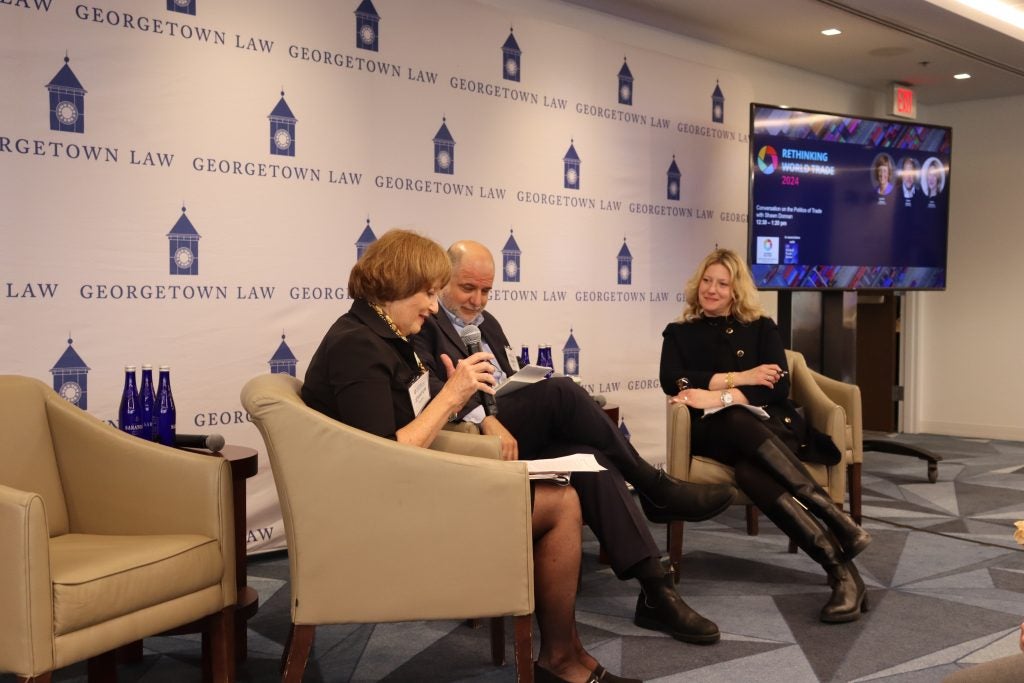In Conversation with Shawn Donnan

From left to right: Jennifer Hillman, Shawn Donnan, and Katrin Kuhlmann
Published May 9, 2024 by Elizabeth Butscher
To conclude our second annual Rethinking World Trade event, CITD Co-directors Professors Jennifer Hillman and Katrin Kuhlmann engaged in conversation with Shawn Donnan. Shawn previously served as the world trade editor for the Financial Times, where he covered global trade and development, as well as the International Monetary Fund and the World Bank. Now a senior writer at Bloomberg, Shawn weaves together the macroeconomic picture of trade and globalization, with a focus on their impact on local communities.
The conversation centered on the disconnect between trade and globalization policies and their impact on everyday individuals, questioning the extent to which portrayals by politicians and the media bear any relationship with reality. Depending on where you look within the United States, Americans are experiencing varying economic realities. For instance, while the seven battleground states for the upcoming presidential election encompass a 4.4 trillion-dollar economy, there are 300 counties in the U.S. that have still not returned to their pre-pandemic economic levels. Although economists assert that the American economy is strong overall, many Americans believe the economy is failing and hold President Joe Biden responsible. There are complaints about the loss of manufacturing jobs to countries with cheaper labor, even though, for the first time since the 1970s, the U.S. economy has added more manufacturing jobs than it lost. This highlights the discrepancies between policy and its effects on individuals. Shawn argued that addressing these discrepancies is complex and requires a comprehensive analysis of both the positives and negatives of trade policy. He emphasized the need to come to terms with the fact that not every policy leads to a positive outcome.
Trade is often blamed for economic distress or widespread job loss, sometimes because it adversely affects certain industries, but also because trade is an easy target for criticism. While trade policy may render production in a certain region or sector unviable, industry challenges may also stem from changes in consumer interest or demand and domestic competition. Trade policy may not be the biggest or sole contributor to domestic employment concerns, but when trade policy does affect certain communities, its effect is often concentrated and considerable, helping exacerbate already existing inequalities. Shawn contended that trade policy needed to be more proactive in fostering inclusion. However, he noted that it is often an aggravator of already existing problems rather than the root cause. While trade policy can widen inequalities, it is also important to address the domestic policies that have allowed these inequalities to develop in the first place.
Trade policy has become very politically salient, but not always for the right reasons. After many years of covering different Presidential Administrations, Shawn has observed first-hand how trade policy has emerged as a key political issue, especially within the Republican party. Former President Donald Trump increased tariffs against Chinese imports and was met with criticism from some conservatives and Republican voters. However, he did find support in his voting base and Republican-led Congress declined to take direct action to combat these tariffs. Evidence suggests that these tariffs did not achieve their intended economic effects and instead triggered retaliatory measures from China. Despite this, rhetoric on tariffs and trade wars with other countries continues to receive popular support.
During the conversation, Shawn emphasized the importance of understanding the individual experience in evaluating trade policy. Job loss in the United States can be particularly pronounced, and the fear of losing a job can weigh heavily on the average American—more than some policymakers and economists might realize. With the often extreme costs of health care in the U.S. (and with health insurance typically provided by employers) and a lack of many expansive and easily identifiable social services, losing a job means that one’s safety net is heavily depleted, if not entirely taken away in one fell swoop. To improve the perception of trade policy and turn it into a force for good, these policies must prioritize the human experience. Rather than merely focusing on trade adjustment systems or restrictive retraining programs, Shawn advocated for establishing genuine safety nets for those affected. Economists can project the impact of trade policies in their models, but until the experiences of those directly affected are considered, there won’t be a full understanding of their impact. The success of trade policy depends on understanding the granular needs of the public and tailoring policies accordingly.
